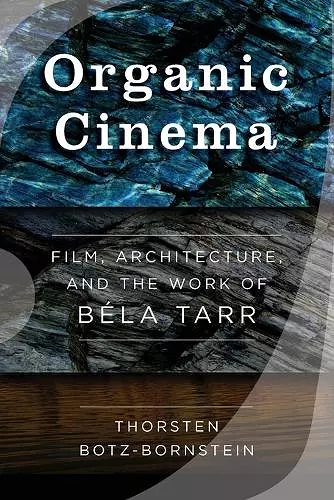Organic Cinema
Film, Architecture, and the Work of Béla Tarr
Thorsten Botz-Bornstein author
Format:Paperback
Publisher:Berghahn Books
Published:9th Mar '21
Should be back in stock very soon

The “organic” is by now a venerable concept within aesthetics, architecture, and art history, but what might such a term mean within the spatialities and temporalities of film? By way of an answer, this concise and innovative study locates organicity in the work of Béla Tarr, the renowned Hungarian filmmaker and pioneer of the “slow cinema” movement. Through a wholly original analysis of the long take and other signature features of Tarr’s work, author Thorsten Botz-Bornstein establishes compelling links between the seemingly remote spheres of film and architecture, revealing shared organic principles that emphasize the transcendence of boundaries.
“Botz-Bornstein’s book Organic Cinema contains a lot of food for thought. It is a non-standard piece on film with a new suggestions and new readings. I recommend it to those of you who want to read about more than just Tarr as a director, but who would like to learn about the context which his films and his filmmaking is embedded in. It’s a thoroughly interesting book.” • European History Quarterly
“While combining film theory with the theory of architecture, music and theology, the organic method could offer a new alternative to deconstructionism, constructivism, cultural studies, and cinema aesthetics. For this reason, Organic cinema deserves academic attention, especially because it has the potential to create a new platform.” • Studies in Eastern European Cinema
“Organic Cinema is an extremely dense text, rich with philosophical, aesthetic, filmic, and musicological insights. The book’s depth and breadth are certainly impressive, offering a valuable — even audacious — contribution to film theory and architectural theory. Botz-Bornstein is at his best when he makes the radical connections between architecture, cinema and musical theology… [and in this way] contributes to the evermore burgeoning field in which architectural theory and film are considered together.”• Invisible Culture
“A magisterial, transdisciplinary contribution and brilliant comparative analysis of a major contemporary filmmaker whose work remains undertheorized and insufficiently known in a global framework. Organic Cinema presents a wealth of perspectives on the interlocking fields of cinema and architecture.”• Catherine Portuges, University of Massachusetts, Amherst
ISBN: 9781800730090
Dimensions: unknown
Weight: unknown
238 pages